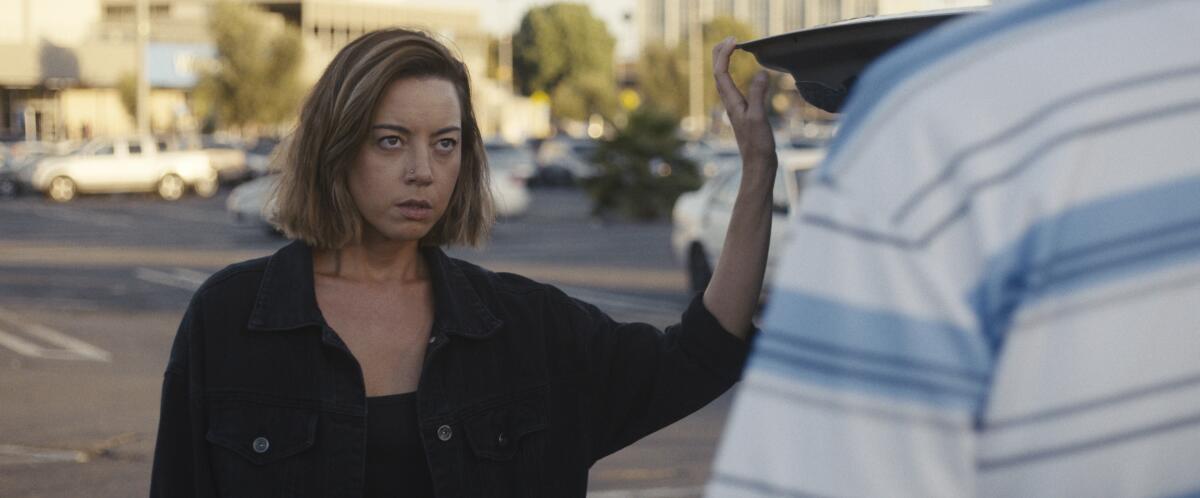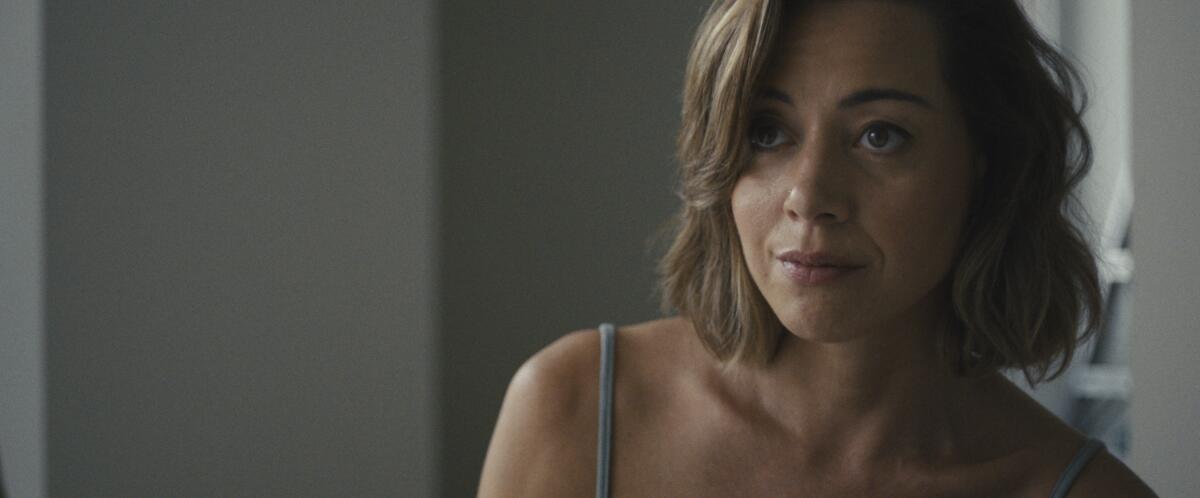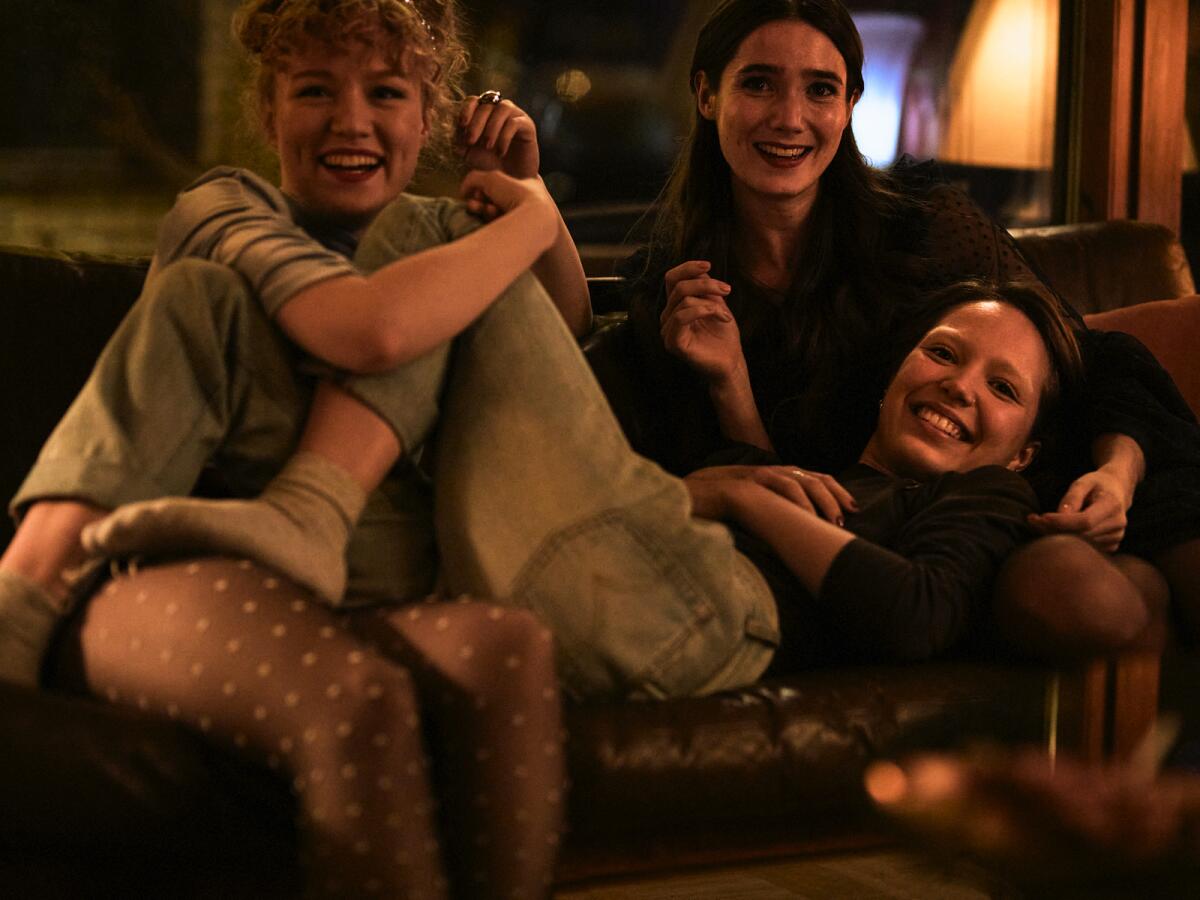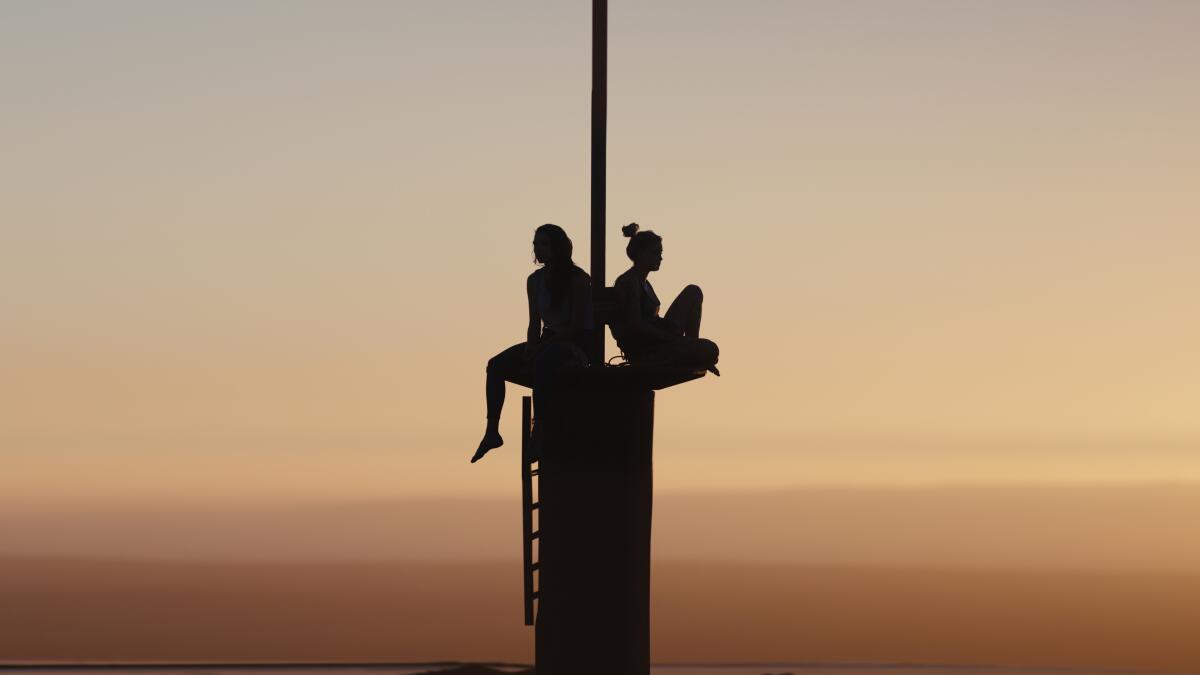Aubrey Plaza surprises again in ‘Emily the Criminal’

Hello! I’m Mark Olsen. Welcome to another edition of your regular field guide to a world of Only Good Movies.
Only good movies
Get the Indie Focus newsletter, Mark Olsen's weekly guide to the world of cinema.
You may occasionally receive promotional content from the Los Angeles Times.
A tribute to Bob Rafelson. This weekend the American Cinematheque launches a tribute to writer, director and producer Bob Rafelson, who died July 23 at age 89. Rafelson was a self-styled iconoclast and a key figure in what became known as the New Hollywood of the 1960s and ’70s. The Cinematheque tribute will feature “Five Easy Pieces,” starring Jack Nicholson; “The King of Marvin Gardens,” starring Bruce Dern; “Stay Hungry,” starring Jeff Bridges; and “Head,” starring the Monkees and co-written by Rafelson and Nicholson. As Rafelson described himself to journalist Kristine McKenna for a 1986 profile in The Times, “I felt almost systematically rebellious for many years.”
“Heat 2” hits shelves. Filmmaker Michael Mann released his debut novel this week, “Heat 2,” co-written with crime novelist Meg Gardiner. The book is both sequel and prequel to what has become Mann’s defining film, 1995’s “Heat,” which starred Robert De Niro and Al Pacino. The filmmaker-turned-novelist spoke to Jordan Riefe about the book and said of the story, “It never left me.” A 4K home video release of Mann’s “director’s definitive edition” of “Heat” has also just come out, for anyone who wants the whole experience.
“Spin Me Round” screening. One of my favorites at the SXSW Film Festival last spring was “Spin Me Round,” directed by Jeff Baena, who co-wrote the screenplay with the film’s star, Alison Brie. Which is why I am very excited for our Indie Focus Screening Series event on Monday featuring the film and a Q&A with Baena and Brie. The story is about the manager of an Olive Garden-style restaurant in Bakersfield who is sent on a corporate retreat to Italy and is in for more of an adventure than she’s bargained for. The fantastic ensemble cast also includes Aubrey Plaza, Molly Shannon, Alessandro Nivola, Tim Heidecker, Lil Rel Howery, Ego Nwodim and Fred Armisen.
Enjoying this newsletter? Consider subscribing to the Los Angeles Times
Your support helps us deliver the news that matters most. Become a subscriber.
‘Emily the Criminal’
Written and directed by John Patton Ford in his feature debut, “Emily the Criminal” is another strong showcase for actor and producer Aubrey Plaza, who has become one of the most surprising and exciting performers in current American cinema. Plaza plays Emily, a young woman saddled with student debt who falls into a petty scam for quick cash and soon escalates her way up the ladder of underworld schemes. The film is both a brittle character study and a pulse-racing thriller and is in theaters now.
For The Times, Justin Chang wrote, “Plaza doesn’t have to steal scenes in ‘Emily the Criminal.’ She plays the title role, and nearly every moment — starting with the one where Emily storms out (not for the last time) of a degrading job interview — rightly belongs to her. Written and directed by the first-time feature filmmaker John Patton Ford, the movie is both an engrossing thriller and a pointed takedown of predatory capitalism, with a protagonist who straddles a hellish Venn diagram of student loan debts, exploitative labor practices and sheer rotten luck. … It isn’t hard work that bothers Emily; it’s how little she and (by extension) millions of Americans get in return for their hard work, thanks to social forces more cruelly, immorally exploitative than any one individual’s unlawful activities. This may be the story of Emily the criminal, but Ford reserves his harshest indictment for the system that created her.”
For Vulture, Alison Willmore wrote, “What makes [Plaza’s] performance so compelling is how she plays Emily as someone barely able to bring herself to quirk her lips into a smile or make other efforts to disguise her flintiness, even as she realizes that allowing glimpses of her anger just gets her into more trouble. Well, it gets her into more trouble when she’s navigating the white-collar spaces she aspires to, which happen to require more pleasantries and [s—]-taking than she has a capacity for. In the extralegal underworld she becomes more and more enmeshed in, her intractability and willingness to commit violence turn out to be advantages.”
For the Wrap, Katie Walsh wrote, “This tough, gristly crime thriller is a searing indictment of late-stage American capitalism, and a showcase for star and producer Plaza to reveal a steely new side to her talent. … In wrapping capitalist critique in a crime drama about an individual consistently locked out of traditional modes of advancement, ‘Emily the Criminal’ isn’t so much Plaza’s ‘Heat’ as it is her ‘Scarface.’ Floating somewhere in the liminal space between humanity and sociopathy, Tony Montana and Emily seem to live by the same morally suspect, ruthlessly survivalist code.”
For IndieWire, Kate Erbland wrote, “As the eponymous antihero at the heart of Ford’s film — his feature debut after first earning accolades at Sundance over a decade ago for the lauded short ‘Patrol’ — Plaza continues to build on her post-‘Parks and Recreation’ career with serious style. Thanks to turns in projects as varied as ‘Black Bear,’ ‘Ingrid Goes West,’ and ‘Happiest Season,’ Plaza (who also produced Ford’s film, adding to a growing résumé) has managed to turn her pitch-black sarcasm into something with real depth and nuance. You always know a Plaza performance will be good, but over the past few years, Plaza has seemed to make it a priority to surprise her audiences with just how good she is.”

Enjoying this newsletter? Consider subscribing to the Los Angeles Times
Your support helps us deliver the news that matters most. Become a subscriber.
‘Girl Picture’
Directed by Alli Haapasalo from a screenplay by Ilona Ahti and Daniela Hakulinen, the Finnish movie “Girl Picture” presents a fresh, charming take on the teen girl coming-of-age story. The movie follows best friends Mimmi (Aamu Milonoff) and Rönkkö (Eleonoora Kauhanen), who spend all their time together, even as Mimmi begins to pursue a romance with Emma (Linnea Leino). The movie is in theaters now.
For The Times, Robert Abele wrote, “There are obstacles and setbacks in each girl’s quest, of course, but unlike how we’ve been primed since forever from teen dramas to expect a severe adult, cruel peer or societal rule to take that hindering form, Mimmi, Emma and Rönkkö are refreshingly both their own worst enemies and, in the context of a world that lets them be who they are, their only way forward. In other words, they’re gloriously human, and in this trio of vividly turned performances — especially Leino’s and Milonoff’s, whose eyes and postures convey so much — we feel each start and stop, every rush and ache.”
For the New York Times, Amy Nicholson wrote, “The characters are all much harder on themselves than is the film itself, which grants them a judgment-free sanctuary (even as they make mistakes that may have the audience yelping like at a horror flick). Instead, Haapasalo blesses her trio with a pop soundtrack that crescendos at the peak of a kiss, and climactic crises that are a mite too readily resolved, adamantly gracing this awkward stage of girlhood with forgiveness — not hectoring lessons.”
For the Wrap, Fran Hoepfner wrote, “These girls are figuring out who they are, and the script is smart enough to know they won’t have answers to those questions after the third Friday night. … ‘Girl Picture’ ought to feel content with its flowy, not especially narrative form, but by its final act, the film starts to scramble for a plot. Tensions that were otherwise buried or non-existent rear their ugly heads, and in an instant, the girls are at odds with each other. It’d be one thing if “Girl Picture” was brave enough to leave things unresolved, as they often are, but instead there’s a rush towards closure and neatness that leaves a rushed, unfulfilling taste in the mouth.”

‘Fall’
Directed by Scott Mann, who co-wrote the screenplay with Jonathan Frank, “Fall” is a simple, tense action thriller. Becky (Grace Caroline Currey) has been struggling to move forward from the death of her husband when her estranged best friend, Hunter (Virginia Gardner), convinces her to climb a remote 2,000-foot-tall TV tower. Getting down proves more complicated. The movie is in theaters now.
For The Times, Noel Murray wrote, “On the upside, ‘Fall’ does what the best survival movies do, by carefully enumerating the resources the heroes have at their disposal so that we can enjoy watching them figure out how to deploy these pieces wisely — or wince as they waste chances. … A similar question could be asked of the filmmakers: Can they do enough with this tiny amount of material to fill a whole movie? Well … sort of. Mann and Frank throw in some unexpected twists and obstacles, but while this film is quite long, it still feels like it’s missing one or two more story beats, either early or late.”
For the New York Times, Lena Wilson wrote, “If you, too, are afraid of heights, you’re likely to experience ‘Fall’ as a straightforward horror movie instead of a thriller. … Most of all, this is an impressive feat of cinema. The bulk of the film was shot on a 60-foot platform on top of a mountain, to keep things looking realistic. Of course, that only makes ‘Fall’ all the more harrowing. As Becky and Hunter’s brushes with death compounded, I kept flattening myself into my seat like a literal scaredy cat. Be glad it’s not playing in IMAX.”
For Vanity Fair, Richard Lawson wrote, “‘Fall’ is a survival story, a study in managed panic and clever resourcefulness. Befitting the genre, there’s even a menacing animal, one whose entrance has been nicely foreshadowed earlier in the film. … I know, intellectually, that these two actors weren’t really at the top of an enormous antenna while Mann and his camera circled them in a helicopter. But it often looks like that’s exactly what happened — much more so than in any number of movies that have spent lavishly on synthetic imagery at the expense of old-fashioned ingenuity. ‘Fall’ is a crafty little movie that grips, and rarely lets go, for 100 or so minutes. It’s a welcome refreshment here in the badlands of August, when the search for excitement so often comes up short.”

Only good movies
Get the Indie Focus newsletter, Mark Olsen's weekly guide to the world of cinema.
You may occasionally receive promotional content from the Los Angeles Times.




